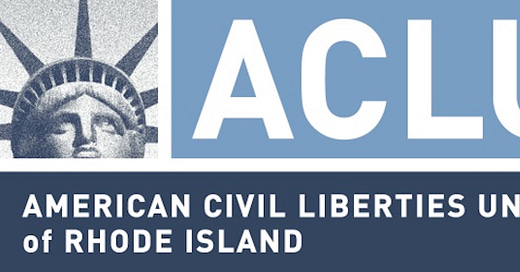"Which police departments sent officers to a blatantly discriminatory training program?" asks RI ACLU
"Rhode Islanders deserve to know which police departments sent officers, however unwittingly, to learn how to engage in unconstitutional traffic stops and searches..."
From a press release:
Responding to a recent report indicating that some Rhode Island-based police officers took privately-run training courses that promoted the use of unconstitutional policing tactics for motor vehicle stops and included blatantly discriminatory and offensive comments about women and people of color, the American Civil Liberties Union of Rhode Island today filed open records requests with every police department in the state to find out which of them sent officers to those courses.
A report recently issued by the New Jersey State Comptroller examined the content of a six-day conference conducted in that state by a privately-run police training agency known as Street Cop Training. The report documents how instructors at the conference – which was supposedly representative of the company’s training sessions generally – encouraged the almost 1,000 attendees from across the country to rely on a wide array of innocent conduct as grounds to pull over drivers for traffic stops and searches. The conference, the report further documented, also “included over 100 discriminatory and harassing remarks by speakers and instructors, with repeated references to speakers’ genitalia, lewd gestures, and demeaning quips about women and minorities.”
The detailed report listed Rhode Island as one of numerous states in which law enforcement agencies had paid for officers to attend one or more of these trainings, but it did not indicate how many or which police departments had done so. In a letter sent last week to the Rhode Island Police Officers Commission on Standards and Training, the ACLU asked the Commission to “determine which police departments paid for and sent officers to any of this company’s training, to make the results of your investigation public, and to take affirmative steps to retrain any officers who attended the seminars and were provided improper and unconstitutional training.” However, the Commission demurred, claiming such an investigation was out of its jurisdiction, prompting the ACLU’s open records requests to 39 police departments today to find out which of them participated.
The ACLU letter to the Commission had also called the disclosure of a Rhode Island presence at any of these conferences “troubling” in light of continued opposition by police chiefs to the passage of state legislation formally reinstating provisions of the Comprehensive Community-Police Relationship Act (CCPRA) that expired in 2020, which mandated the collection and analysis of traffic stop data for racial disparities.
“The New Jersey report is eye-opening and extraordinarily disturbing. Rhode Islanders deserve to know which police departments sent officers, however unwittingly, to learn how to engage in unconstitutional traffic stops and searches, and whether steps will be taken to retrain them,” said ACLU of RI executive director Steven Brown. “This revelation only highlights the crucial need for the General Assembly to reinstate the law mandating the collection and review of traffic stop and search data, passage of which has been stymied by law enforcement for four years despite the clear need for its revival.”
Among the dozens of examples provided in the report of discriminatory conduct at the conference were an instructor flashing a photo of a monkey while telling participants about his interaction with a 75-year-old Black man, and instructors’ use of words like “retard” and “bitch” in describing people. The conference also provided attendees a “Reasonable Suspicion Factors Checklist” that listed completely innocent behavior as grounds for pulling over drivers, such as drivers and passengers conversing but looking forward instead of at each other, and motorists indicating turns “way too soon” or “[w]aiting until the very end to turn signal on.”
Under the Access to Public Records Act, the police departments will have 10 business days to respond to the ACLU’s request for information.
The ACLU’s letter to the Commission, the Commission’s response, and the New Jersey Comptroller’s report are available here.



